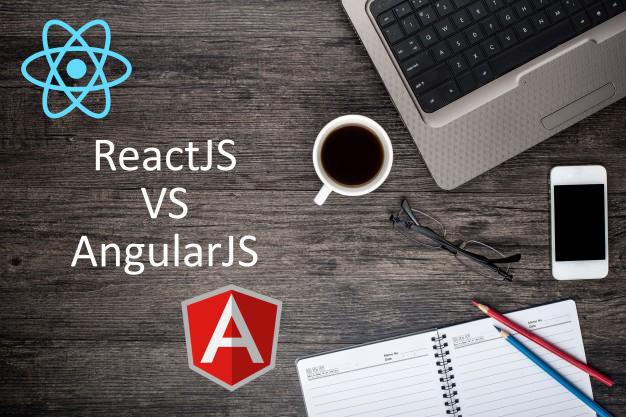The world has an insatiable appetite for new and better apps. And today, apps voice a brand of the company. Therefore, it is very important for the voicing should have the soul conveying the message in the right direction, for the right purpose. The framework is one of the most important aspects of any web app or mobile app development project. The term means beginning for a stylish design and provide a foundation on which the rest of the developed project will stand.
ReactJS vs AngularJS
Let’s put everything aside and focus on the JavaScript community for a while. ReactJS vs AngularJS is a growing topic of conversation among several tech geeks and tech learners. As one wrong move can have a direct bearing on project’s durability and ability to fit in deadlines, code maintainability, and scalability of the future app. In the following post, we have analyzed features of both major cutting edge players for you. So that you can decide which one to pick.
AngularJS
With its inception in 2009, Angular has come a long way. By far, there are up to version 1.3.8 now, with semi-regular releases. Lately, there’s been some kind of buzz about Angular 2.0 which was meant to change a lot about the framework and it did! The current Angular version uses various attributes and custom HTML elements to provide functionality on various DOM elements. Popularly known as directives, they are very versatile in nature. The setup code may seem a little passe, as it requires an application and a controller, as well as definitions for any directives you’re building.
In order to make the most out of the framework, it is always advisable to connect with a recognized AngularJS development company that tends to provide high-end solutions like never before.
ReactJS
For those who have never heard of ReactJS, it’s a performance-minded view renderer created by Facebook guys. There was a time when a lot of heavyweight contenders for MVVM frameworks have a hard time rendering large amounts of data, like in lists and such. But with the adoption of ReactJS, everything got sorted. React doesn’t have that problem, as it renders only what’s changed. For instance, if a user is viewing a list of 100 items rendered with React, and somehow if he or she changes the third one down. Then only that item gets rerendered, leaving the other 99 items unchanged.
It also makes use of Facebook “Virtual DOM” for some increased performance by writing out a full render virtually and then checking the difference between the virtual render and what’s actually on the DOM.
A Deep Comparison
• Scalability
Angular is pretty much easy in terms of scaling, all thanks to its design as well as a powerful CLI. Whereas on the other hand, React is testable and therefore scalable compared to other frameworks.
• Computed Properties-
Speaking in terms of performance, plain getters in AngularJS are out of the scenario because they get called on each render. It is, however, possible to use BehaviorSubject from RsJS, as it serves the purpose. React allows the use of @computed from MobX – achieving the same objective but with a nicer API. Dependency Injection.
• Dependency Injection
It is a bone of contention as it is contrary to the prevalent React paradigm of functional programming and immutability. However, some sort of dependency injection is almost unavoidable in data-binding environments. This is because it aids in decoupling especially where there is no separate data-layer architecture. Angular supports DI. And many AngularJS development companies believe the ability to have different life cycles for different stores as its finest advantage.
• Simplicity + Code Length
ReactJS is quite easy and simple to understand but it takes some time to set up a project. Whereas Angular, on the other hand, is not simple by means. Its inherent complexity sometimes causes confusion and Angular specific 3rd party libraries and syntax.
• Model Complexity
Angular’s performance is sensitive in comparison to ReactJS because of copy-n-compare nature. As a result, you cannot use large models. This point has benefits and disadvantages both. The Pros are that it makes the code simpler and more testable. But the cons are that you need to break down stuff that you normally use and rebuild it again (for example – for server requests).
React however gives you the power of choice without the performance penalty. The outcome really depends on whether you’re a good coder or a bad coder.
Which is better?
Both React and Angular work on completely diverse approaches in front-end application development, be it for a startup, small and medium enterprises. In fact, for me, they both are powerful and flexible and while neither is better or worse. All it depends on your business application.













No Comments